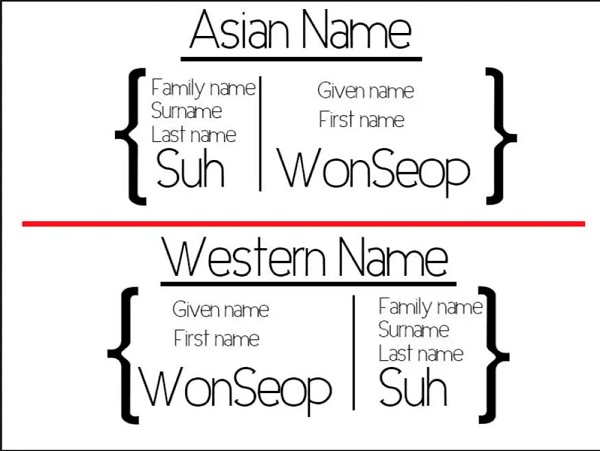
How do you write your name? Use of multiple personal name orders
How do you write your name?
A cardinal rule in naming is to avoid creating confusion.
And this is rule in Biology, the study of life, as governed by the rules of binomial nomenclature (i.e., the two- term naming system for writing scientific names of organisms, where the genus/generic name always comes first, followed by the specific name/specific epithet).
For example, modern humans are scientifically known as Homo sapiens.
But if this name was switched to “Sapiens homo,” it would no longer refer to humans!
For most other naming systems in real life, adherence to naming rules is crucial, too, to avoid confusing others and to prevent mistaken identities.
In human societies, personal name order conventions have evolved to enable others to easily identify the first name, middle name (if any), and surname of others.
However, it is generally unknown if multiple personal name orders can coexist in a single society, and what problems that may create.
This has previously prompted a commentary on the emergence of dual personal name orders in Uganda, for example.
In this essay, I discuss the existence of, and widespread use of, two different personal name orders in Ghana, to create a greater awareness around this issue and its potential ramifications for professionals such as academics.
Common types
Across the world, there are two well-known systems for ordering personal names.
These are the so-called “Western Name Order” (hereafter “WNO”) and the “Eastern Name Order” (hereafter “ENO”).
In the WNO (which applies in most of the western world and many other parts of the world), personal names are written in the following order: first name (a.k.a. forename/given name), followed by middle name(s), followed by last/family name (a.k.a. surname).
The personal name “Donald John Trump,” for example, follows the WNO, whereby Donald is the first name, John the middle name, and Trump the surname.
In the ENO (which applies in some East Asian countries such as Japan), surname is written first, followed by the given name (i.e., the reverse of the WNO).
In fact, the late Japanese Prime Minister known in western circles or media as Shinzo Abe was actually “Abe Shinzo” in Japan.
Indeed, the Japanese government protested the westernization of their prime minister’s name order in 2019 when it said that it wanted western media to call their prime minister “Abe Shinzo” (not “Shinzo Abe”), just as they would call Chinese president “Xi Jinping” (not “Jinping Xi”).
Personal name order preferences
I had always assumed that Ghanaians followed the WNO, until some years ago when I realized that both WNO and ENO were being used by Ghanaians, and that this situation was quite widespread.
For instance, during the 2019 National Science and Maths Quiz (NSMQ) competition in Ghana, contestants from the following schools presented their names as indicated below: TI AMASS: Owusu Ansah Kingsford, Ishmael Kofi Mensah Keta SHTS: Paul Treve, Avu John
St. Augustine’s College: Maino Afful Joseph Kweku, Anthony Papa Eliason.
A person familiar with Ghanaian names may notice that Ishmael Kofi Mensah of TI AMASS and Paul Treve of Keta SHTS presented their names following the WNO, whereas Owusu Ansah Kingsford and Avu John presented their names following the ENO.
Yet, while Maino Afful Joseph Kweku of St. Augustine’s College wrote his name following the ENO, the name order was less clear for Anthony Papa Eliason, because in Ghana, the name “Anthony” is either used as surname or first name.
There were also rare occasions in the NSMQ when a contestant appeared to have placed their last name in the middle of their names (e.g., “Pearl Tsewoo Esene” of Akatsi SHTS during the 2022 NSMQ).
What is more, you may find people in Ghana carrying only two names, either of which is a typical Ghanaian surname (e.g., someone with the full name “Osei Akoto”).
Thus, sometimes, one may necessarily have to guess a person’s first name, when multiple personal name orders are in use.
Interestingly, some textbook authors in Ghana have also used the two common personal name orders.
For example, the author names “Henry Adjei Amankwah” and “Aning K. Ishmael” which appear on the cover of the Creative Arts for Basic Schools (A.A. Series) Pupil’s Book 2, follow the WNO and the ENO, respectively.
Implications of multiple personal name orders
In societies where the WNO is generally assumed, anyone using the reverse order risks being misidentified in some contexts, which, for academics, could lead to loss of credit when their work is misattributed to someone else by readers.
For example, if I wrote my personal name as “Agorsor Israel,” following the ENO, that could easily become “A. Israel” in publication indexing databases and also when references are written for academic works, effectively rendering “Israel,” rather than “Agorsor,” as my surname.
To ensure I receive proper credit for my work, I may need to correct the published record, which would require spending additional time, effort and resources.
Recommendations
The ENO usage may have gained currency in Ghana, along with the more popular WNO, because in School Attendance Registers at the lower levels of education, student names are arranged in alphabetical order using surnames (i.e., surname first).
Hence, some may have learned that surnames could normally be placed/mentioned first, helping to introduce the ENO.
To resolve the confusion this may create, it should be stressed that if one follows the WNO but decides to write their surname first, instead of ‘first name’ first, the surname would be delineated from the first name using a comma (e.g., Kufuor, John).
This prevents confusion.
The writer is a Biologist at the University of Cape Coast, Ghana.
E-mail:
